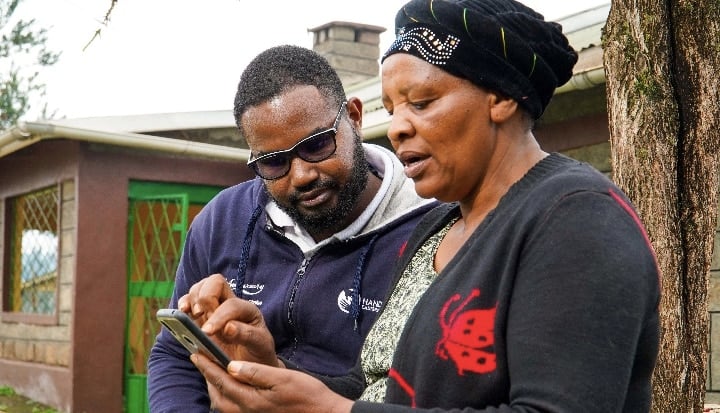In 2020 Hand in Hand began an innovative project with Visa Inc., providing advanced business and digital training to 1,280 female microbusiness owners living in Nairobi’s informal settlements, described by the UN as “some of the most dense, unsanitary and insecure slums in the world.”
But, just months after the project began, Kenya was hit by its first wave of coronavirus cases, and the country locked down. For Kenyans, the pandemic wasn’t just a health crisis, it was an economic crisis as well – devastating livelihoods and pushing millions of families below the poverty line.
Despite the pandemic, the results of this ‘acceleration’ training were extraordinary – with women typically boosting their profits by 95% (compared to 15% for our ‘control group’ of first-time entrepreneurs) – earning an additional USD 192 per month.
Fighting digital exclusion
Women in Nairobi’s most deprived communities are less than half as likely as men to access the internet. But, with the Kenyan e-commerce sector worth around $2bn, we believe it’s vital that women entrepreneurs have the chance to take part in the digital economy, instead of being excluded from it.
Participants learned how to market and sell their products online, using Jumia, Facebook Marketplace and WhatsApp, with the majority reporting that, by using these digital channels, they had more than doubled sales. On average, each woman expanded their businesses by 43% – even as Covid lockdowns wiped out a third of Kenya’s MSMEs.
Improving financial literacy
Programme members also received vital financial training. This proved to be a lifeline during the pandemic, as when lockdown struck they were able to act quickly to cut their costs – with an average cost reduction of 43% per member. As a result of the training, 90% of participants on the programme reported they would be able to withstand a financial shock without having to sell an asset or get into debt – even at the height of the crisis, which saw over 40% of Kenyans skipping meals to get by (World Bank.)
Damiana: from fish seller to wholesaler and digital retailer
Thanks to the training, Kawangware fish seller Damiana Musyoko increased her earnings by 212%. Social media marketing and e-commerce have been critical to her success. With training and support from her social media mentor she has secured contracts with three high-end hotel restaurants through her online platforms alone. In Kawangware, most people live below the international poverty line of $2.15 a day. In comparison, Damiana is now earning over USD $500 a month – transforming life for herself and her family.
How Pauline grew her customer base online
But it’s not only women in urban areas who have benefited from advanced entrepreneurship training. Before the project began, farmer Pauline Mbugua would sell her bananas at a roadside stall, earning just enough to put food on the table. After taking part in digital training Pauline has expanded her customer base by going online, and is selling macadamia nuts directly to wholesale off takers. Pauline says, “I didn’t get to complete my high school education but joining Hand in Hand really helped me. Now I know selling online is better as compared to local sales.”
Breaking down barriers to women’s success
Thanks to this project with Visa Inc. thousands of women like Pauline and Damina have been able to confound expectations and succeed as entrepreneurs, even in the midst of a global pandemic. As a result of the training – which included social media marketing skills and support to access credit, they’ve been able to expand their businesses and lift their families out of poverty for good. What’s more, many of them have now become employers, creating much-needed jobs in their communities.
Hand in Hand is expanding our work tackling digital and financial exclusion, with the aim of doubling the number of women entrepreneurs we reach in the next three years in Nairobi and beyond. To find out more about partnering with us please contact us here.
Author Lucy Kerei, Programme Manager, Hand in Hand Eastern Africa










